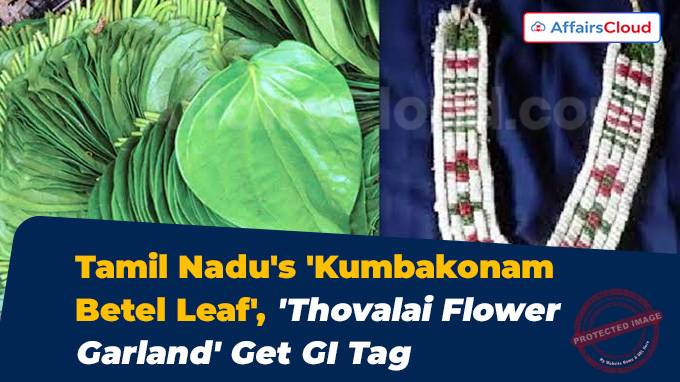 In April 2025, the Geographical Indications (GI) Registry in Chennai, Tamil Nadu (TN), under the Department for Promotion of Industry and Internal Trade (DPIIT), Ministry of Commerce and Industry (MoC&I), granted Geographical Indication (GI) Tag to two indigenous products from TN – the Kumbakonam Betel Leaf from Thanjavur and the Thovalai Flower Garland (Manikka Malai) from Kanyakumari.
In April 2025, the Geographical Indications (GI) Registry in Chennai, Tamil Nadu (TN), under the Department for Promotion of Industry and Internal Trade (DPIIT), Ministry of Commerce and Industry (MoC&I), granted Geographical Indication (GI) Tag to two indigenous products from TN – the Kumbakonam Betel Leaf from Thanjavur and the Thovalai Flower Garland (Manikka Malai) from Kanyakumari.
- With this recognition, TN now has a total of 62 GI-tagged products, including 11 from the Thanjavur district.
What is a GI Tag?
The GI Tag is a legal recognition under the Geographical Indications of Goods (Registration and Protection) Act, 1999, which identifies products tied to a specific region due to their unique qualities.
Significance of Kumbakonam Betel Leaf and Thovalai Manikka Malai:
i.Kumbakonam Betel Leaf is renowned for its unique taste, aroma, and heart-shaped appearance, cultivated in the fertile Cauvery river basin in areas including Thiruvaiyaru, Papanasam, Thiruvidaimarudur, Kumbakonam, and Rajagiri.
- These leaves are primarily grown by small and marginal farmers who benefit from the enhanced market value and export potential due to the GI Tag.
ii.Thovalai Manikka Malai, handcrafted by skilled artisans in Thovalai, Kanyakumari, is a decorative garland made using oleander, rose flowers, nochi leaves, and chamba fiber.
- The garland’s intricate design, which resembles gemstones, requires a meticulous folding technique passed down through generations.
iii.For Kumbakonam Vetrilai and Thovalai Manikka Malai, the GI tag offers:
- Protection against misuse and forgery.
- Authenticity for local producers and artisans.
- Economic growth by boosting trade and export opportunities.
Key People:
The successful acquisition of the GI tags was driven by the concerted efforts of P. Sanjai Gandhi, Intellectual Property (IP) Attorney and Advocate, Nodal Officer for Geographical Indication Registration of Products, Government of TN; alongside Tamil Nadu Agricultural University (TNAU), Coimbatore; and the Thovalai Manikkamaalai Kaivinai Kalaingargal Nalasangam, Kanniyakumari.
Ahmedabad’s Saudagari Block Print Receives GI Tag:
The traditional Saudagari Block Print from Jamalpur, Ahmedabad in Gujarat, known for its intricate hand-printed designs, has been awarded the GI tag.
- This recognition aims to protect the unique craftsmanship, ensure authenticity, and improve the economic prospects of the artisans who have preserved this heritage for generations.
About Saudagari Block Print:
i.Saudagari Block Printing is a 300-year-old textile printing technique where artisans use hand-carved wooden blocks dipped in natural dyes to create intricate patterns on cotton fabric.
ii.The Khida community once practiced large-scale block printing, but it declined due to industrialization and modern technology; however, the Chhipa community has preserved and refined the art, traditionally used for making kurtis, chunris, kurtas, dhotis, turbans, and shawls.
Key People:
Shakir Banglawala, a veteran artisan, has preserved the Saudagari Block Print technique by adapting it to modern trends, while his daughter, Irina Banglawala, known for creating block-printed dupattas priced around Rs 2,000, was recently honored in the Young Artisan Category for her innovations.
Note: The MoC&I has set an ambitious target of reaching 10,000 GI tags by 2030.The first product in India to be accorded with GI tag was Darjeeling tea(West Bengal,WB) in 2004-05.
About Geographical Indications (GI) Registry:
Headquarters – Chennai, Tamil Nadu (TN)
Established – 2003




